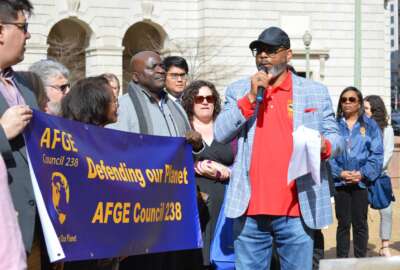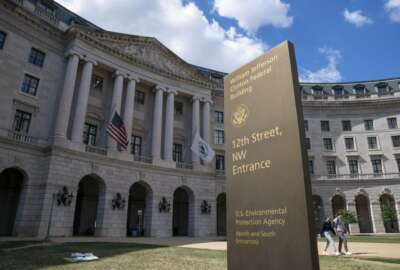
EPA, AFGE hit stalemate over DEIA provisions in union contract
Negotiations over a new DEIA contract article have come to a standstill for the Environmental Protection Agency and the American Federation of Government Employees.
Negotiations between the Environmental Protection Agency and the American Federation of Government Employees came to a standstill over an area relatively new to collective bargaining: diversity, equity, inclusion and accessibility.
Despite agreeing on the importance of many provisions of the draft DEIA contract article, EPA announced a partial impasse Tuesday.
“We were both surprised and disappointed to hear that,” Joyce Howell, executive vice president of AFGE Council 238, which represents about 7,700 EPA employees, said in an interview with Federal News Network.
AFGE initially proposed adding a DEIA article to EPA’s collective bargaining agreement in June 2022. The additional article came after the two parties restored collective bargaining in 2021.
“EPA and AFGE have jointly discussed the feasibility of the [DEIA] provisions and both parties have thoughtfully developed [them] through multiple rounds of proposals,” EPA Press Secretary Timothy Carroll said in an email.
Carroll added that DEIA is an “important priority” for the agency, and many of the efforts are outlined in EPA’s strategic plan, published in March.
But for Howell, the disparity between the agency’s words and actions for DEIA has been “frustrating.”
“I feel like I’m talking to two EPAs,” Howell said. “I hear high-level management talk about their aspirations for setting up a DEIA office at EPA and putting in measures for DEIA. But then I’m at the bargaining table with an agency that won’t commit to DEIA measures with union.”
Adding a DEIA article to the union contract is new for EPA. The initial proposal led to labor-management discussions that have gone on for months.
“It requires a contractual commitment,” Howell said. “That’s different from putting out a plan that says what you hope to do. A contract says you’ve got to do it. There’s a big difference there.”
The ongoing negotiations over several provisions in the DEIA article have “progressed to the point a skilled mediator would be useful,” Carroll said.
In response to EPA declaring an impasse, AFGE wrote a letter to the agency’s leadership Wednesday, raising concerns about the decision.
“During the agency’s all-hands meeting, we heard many touching stories of management’s awakening to DEIA issues in the workplace,” the letter said. “Respectfully, awareness without commitment is meaningless.”
When an impasse in collective bargaining is declared, discussions typically come to a temporary halt. But Carroll said the agency is always open to engaging with the union over open articles.
And it isn’t the first time the agency and union have come to a bargaining impasse. In fact, Carroll said, bringing in a mediator can often be a useful tool in areas of particular contention.
“The agency and the union have found mediation and impasse procedures an effective way to reach agreement in the recent past and we are hopeful that is true in this case as well,” Carroll said.
The partial impasse extends to several of AFGE’s recommendations, which include reviewing implicit bias in the hiring process, training human resources employees in DEIA in the workplace, installing gender-neutral bathrooms in EPA facilities, sharing data on harassment claims sent to the Equal Employment Opportunity Commission, creating a union role on agency DEIA committees, adding DEIA principles to manager performance evaluations and using an independent auditor to evaluate the agency’s DEIA efforts.
Howell said the provisions try to keep the burden on the agency relatively limited. For example, AFGE’s recommendation to install gender-neutral bathrooms at all EPA buildings doesn’t have to happen right away.
“When they move into a new space, they could plan for a gender-neutral bathroom. We weren’t asking for any immediate big construction program.” Howell said.
Despite coming to a standstill over the DEIA provisions, bargaining in other areas is progressing. EPA and AFGE have recently reached tentative agreements on 17 other contract articles.
The agency and union plan to bring in a third-party negotiator from the Federal Mediation and Conciliation Service, which acts as a neutral party for labor-management negotiations once one party declares impasse.
If the impasse still remains after bringing in the third-party negotiator, EPA and AFGE would then move to the Federal Service Impasses Panel (FSIP), housed within the Federal Labor Relations Authority. FSIP makes rulings and issues binding decisions on impasses during collective bargaining.
“The people at EPA are really good people. I think they would welcome things to make them even better. Everyone I’ve talked to has been enthusiastic about DEIA. They see it as a way to make this agency even better,” Howell said.
Copyright © 2025 Federal News Network. All rights reserved. This website is not intended for users located within the European Economic Area.
Drew Friedman is a workforce, pay and benefits reporter for Federal News Network.
Follow @dfriedmanWFED





